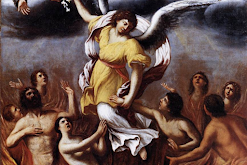Purgatory. Does the Church still teach it and what is it?
In some of our Bible study groups, there have been questions about purgatory. I often speak of this in November, when the Church traditionally intensifies her attention to the "Four Last Things": Death, Judgment, Heaven (and the purgatory needed for many to get there) & Hell.
However, since there has been a lot of false or misleading teaching about purgatory in recent years, I want to address it again. One of the worst false teachings which crept in especially in the 1970s and 1980s is that "the Church doesn't teach purgatory is real any more." That is flat out wrong.
Here are some good brief articles on the topic.
A good Q&A regarding common questions about purgatory from Britain's Catholic Truth Society.
The question of purgatory and time from Catholic blog Aleteia.
At the bottom of this post, I've included some brief excerpts from the Catechism of the Catholic Church on purgatory.
Finally, just a note on the artistic depictions of purgatory. The above Q&A addresses the question of physical suffering in purgatory. A lot of older artwork depicts the "flames" of purgatory (sometimes with an angel lifting people from those flames). That is because some saints and theologians have speculated that purgatory will be physically painful. However, the Church has not spoken definitively on this. so we can't know what the physical side of purgatory will be like until we get there. One way to think about this is as parallel to "burning off" a skin lesion or blasting cancer cells with some kind of radiation. It might be painful, but it is there to "burn off" our attachment to sin to heal us when the process is done.
As always, please don't hesitate to ask me personally if you have more questions!
-----
From the Catechism
III. THE FINAL PURIFICATION, OR PURGATORY
1030 All who die in God's
grace and friendship, but still imperfectly purified, are indeed assured of
their eternal salvation; but after death they undergo purification, so as to
achieve the holiness necessary to enter the joy of heaven.
1031 The
Church gives the name Purgatory to this final purification of
the elect, which is entirely different from the punishment of the damned.606 The
Church formulated her doctrine of faith on Purgatory especially at the Councils
of Florence and Trent. The tradition of the Church, by reference to certain
texts of Scripture, speaks of a cleansing fire:607
As for certain lesser
faults, we must believe that, before the Final Judgment, there is a purifying
fire. He who is truth says that whoever utters blasphemy against the Holy
Spirit will be pardoned neither in this age nor in the age to come. From this
sentence we understand that certain offenses can be forgiven in this age, but
certain others in the age to come.608
1032 This
teaching is also based on the practice of prayer for the dead, already
mentioned in Sacred Scripture: "Therefore [Judas Maccabeus] made atonement
for the dead, that they might be delivered from their sin."609 From
the beginning the Church has honored the memory of the dead and offered prayers
in suffrage for them, above all the Eucharistic sacrifice, so that, thus
purified, they may attain the beatific vision of God.610 The
Church also commends almsgiving, indulgences, and works of penance undertaken
on behalf of the dead:
Let us help and
commemorate them. If Job's sons were purified by their father's sacrifice, why
would we doubt that our offerings for the dead bring them some consolation? Let
us not hesitate to help those who have died and to offer our prayers for them.611
606 Cf. Council of
Florence (1439):DS 1304; Council of Trent (1563):DS 1820; (1547):1580; see also
Benedict XII, Benedictus Deus (1336):DS 1000.
607 Cf. 1 Cor 3:15; 1 Pet 1:7.
608 St. Gregory the Great, Dial. 4,39:PL 77,396; cf. Mt 12:31.
609 2 Macc 12:46.
610 Cf. Council of Lyons II (1274):DS 856.
611 St. John Chrysostom, Hom. in 1 Cor. 41,5:PG 61,361; cf. Job 1:5.
1472. "To
understand this doctrine and practice of the Church, it is necessary to
understand that sin has a double consequence. Grave sin deprives us of
communion with God and therefore makes us incapable of eternal life, the privation
of which is called the 'eternal punishment' of sin. On the other hand every
sin, even venial, entails an unhealthy attachment to creatures, which must be
purified either here on earth, or after death in the state called Purgatory.
This purification frees one from what is called the 'temporal punishment' of
sin. These two punishments must not be conceived of as a kind of vengeance
inflicted by God from without, but as following from the very nature of sin. A
conversion which proceeds from a fervent charity can attain the complete
purification of the sinner in such a way that no punishment would remain. [Cf.
Council of



